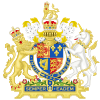| The Right HonourableThe Lord BingleyPC | |
|---|---|
 Portrait attributed to Godfrey Kneller Portrait attributed to Godfrey Kneller | |
| Chancellor of the Exchequer | |
| In office 1711–1713 | |
| Preceded by | The Earl of Oxford and Earl Mortimer |
| Succeeded by | Sir William Wyndham |
| Personal details | |
| Born | c 1676 |
| Died | (1731-04-09)9 April 1731 |
| Nationality | English |
| Alma mater | Christ's College, Cambridge |
| Occupation | politician |
Robert Benson, 1st Baron Bingley, PC (c. 1676 – 9 April 1731) was an English Tory politician who sat in the English and British House of Commons from 1702 until 1713 when he was raised to the peerage as Baron Bingley and sat in the House of Lords. He served as Chancellor of the Exchequer from 1711 to 1713.
Life
Robert Benson was born in Wakefield, the son of Robert Benson of Wrenthorpe. He went to school in London before studying at Christ's College, Cambridge. He served as an alderman of the city of York and was elected Lord Mayor of York for 1707. He was elected Member of Parliament for Thetford in Norfolk from 1702 to 1705, then becoming MP for York from 1705 to 1713.
In 1711, he was sworn of the Privy Council and became Chancellor of the Exchequer until 1713. He was a Director of the South Sea Company from July 1711 to February 1715. In 1713 he was ennobled as Baron Bingley, and became the British ambassador to Spain.
Benson founded the stately home of Bramham Park, near Wetherby. When he died in 1731 he was buried in Westminster Abbey and the title Baron Bingley became extinct, although it was later re-created for his son-in-law. He had married Elizabeth, the daughter of Heneage Finch, and had a son (who predeceased him) and two daughters (one illegitimate). It has often been suggested that Bingley was also the real father of the British soldier, dramatist and politician John Burgoyne, whose debts he cancelled in his will. What was left of his estate, including Bramham Park, went to his daughter Harriet who had married George Fox.
Notes
- "Benson, Robert (BN691R)". A Cambridge Alumni Database. University of Cambridge.
- Drake, Francis (1736). Eboracum: or, The history and antiquities of the city of York.
- ^ "BENSON, Robert (1676–1731), of Red Hall, nr. Wakefield; Bramham Hall, Yorks.; and Queen Street, Westminster". History of Parliament Online. Retrieved 28 November 2013.
References
- Courtney, William Prideaux (1885). "Benson, Robert (1676-1731)" . In Stephen, Leslie (ed.). Dictionary of National Biography. Vol. 4. London: Smith, Elder & Co.
| Parliament of England | ||
|---|---|---|
| Preceded bySir Thomas Hanmer, Bt Sir John Wodehouse, Bt |
Member of Parliament for Thetford 1702–1705 With: Edmund Soame |
Succeeded bySir Thomas Hanmer, Bt Sir John Wodehouse, Bt |
| Preceded bySir William Robinson, Bt Tobias Jenkins |
Member of Parliament for York 1705–1708 With: Sir William Robinson, Bt |
Succeeded byParliament of Great Britain |
| Parliament of Great Britain | ||
| Preceded byParliament of England | Member of Parliament for York 1708–1713 With: Sir William Robinson, Bt |
Succeeded bySir William Robinson, Bt Robert Fairfax |
| Political offices | ||
| Preceded byThe Earl of Oxford and Earl Mortimer | Chancellor of the Exchequer 1711–1713 |
Succeeded bySir William Wyndham, Bt |
| Preceded byPaul Methuen | Treasurer of the Household 1730–1731 |
Succeeded byThe Lord De La Warr |
| Peerage of Great Britain | ||
| New creation | Baron Bingley 1713–1731 |
extinct |
| Chancellors of the Exchequer under the House of Stuart (1603–1649; 1660–1714) | ||
|---|---|---|
| James I (1603–1625) |
|  |
| Charles I (1625–1649) |
| |
| Charles II (1660–1685) |
| |
| James II (1685–1688) |
| |
| William & Mary (1689–1694) |
| |
| William III (1694–1702) |
| |
| Anne (1702–1714) |
| |
- 1670s births
- 1731 deaths
- Alumni of Christ's College, Cambridge
- Lord mayors of York
- Barons in the Peerage of Great Britain
- Peers of Great Britain created by Queen Anne
- Chancellors of the Exchequer of Great Britain
- Diplomatic peers
- Members of the Privy Council of Great Britain
- Members of the Parliament of Great Britain for English constituencies
- Treasurers of the Household
- British MPs 1707–1708
- British MPs 1708–1710
- British MPs 1710–1713
- Ambassadors of Great Britain to Spain
- English MPs 1702–1705
- English MPs 1705–1707